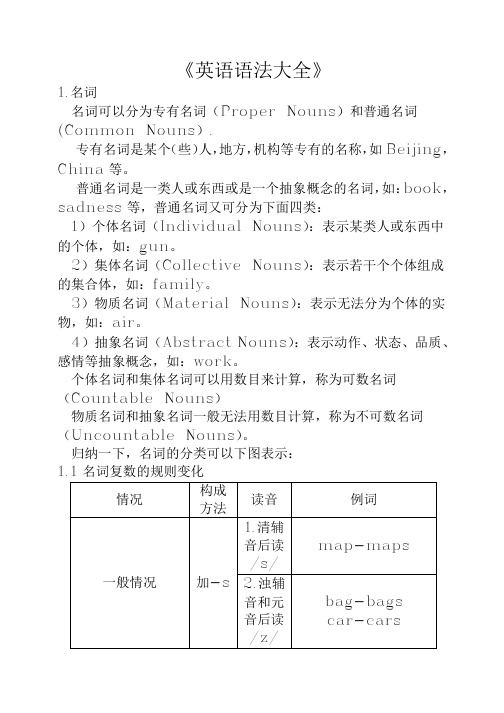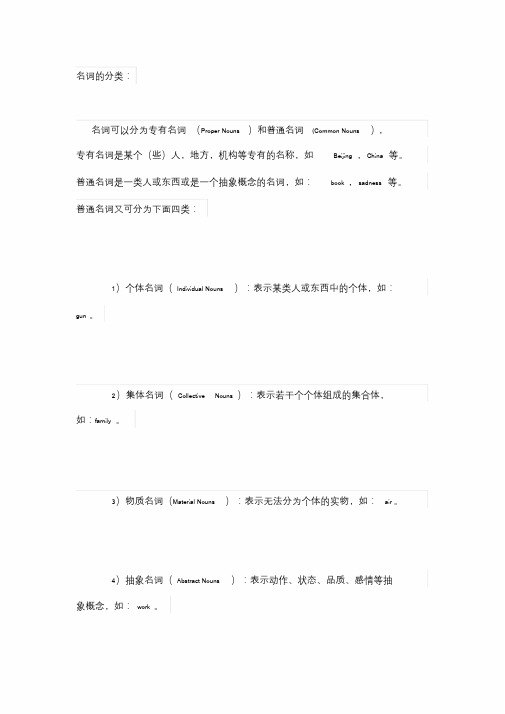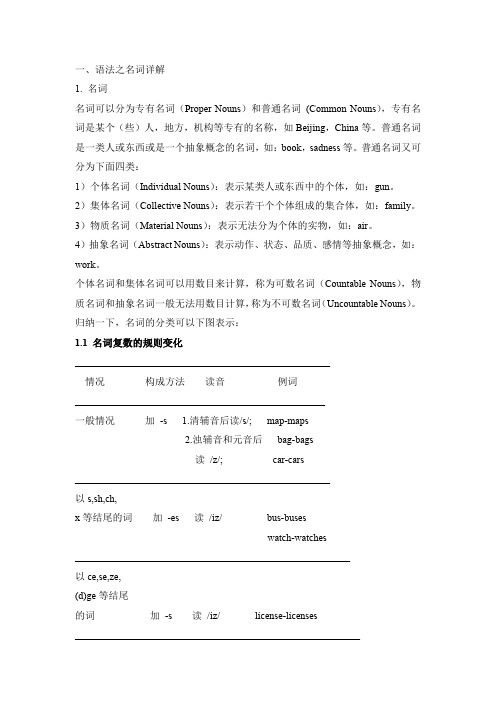common nouns
英语语法大全

《英语语法大全》1.名词名词可以分为专有名词(Proper Nouns)和普通名词(Common Nouns).专有名词是某个(些)人,地方,机构等专有的名称,如Beijing,China等。
普通名词是一类人或东西或是一个抽象概念的名词,如:book,sadness等,普通名词又可分为下面四类:1)个体名词(Individual Nouns):表示某类人或东西中的个体,如:gun。
2)集体名词(Collective Nouns):表示若干个个体组成的集合体,如:family。
3)物质名词(Material Nouns):表示无法分为个体的实物,如:air。
4)抽象名词(Abstract Nouns):表示动作、状态、品质、感情等抽象概念,如:work。
个体名词和集体名词可以用数目来计算,称为可数名词(Countable Nouns)物质名词和抽象名词一般无法用数目计算,称为不可数名词(Uncountable Nouns)。
归纳一下,名词的分类可以下图表示:1.2其它名词复数的规则变化1)以y结尾的专有名词,或元音字母+y结尾的名词变复数时,直接加s变复数:如:two Marys the Henrysmonkey---monkeysholiday---holidays比较:层楼:storey---storeys story---stories2)以o结尾的名词,变复数时:a.加s,如:photo---photospiano---pianosradio---radios zoo---zoos;b.加es,如:potato--potatoestomato--tomatoesc.均可,如:zero---zeros/zeroes3)以f或fe结尾的名词变复数时:a.加s,如:belief---beliefs roof---roofssafe---safes gulf---gulfs;b.去f,fe加ves,如:half---halvesknife---knives leaf---leaveswolf---wolveswife---wives life---livesthief---thieves;c.均可,如:handkerchief:handkerchiefs/handkerchieves1.3名词复数的不规则变化1)child---children foot---feettooth---teethmouse---mice man---menwoman---women注意:与man和woman构成的合成词,其复数形式也是-men和-women。
名词的分类:.doc

名词的分类:名词可以分为专有名词(Proper Nouns )和普通名词(Common Nouns ),专有名词是某个(些)人,地方,机构等专有的名称,如Beijing ,China 等。
普通名词是一类人或东西或是一个抽象概念的名词,如:book ,sadness 等。
普通名词又可分为下面四类:1)个体名词(Individual Nouns ):表示某类人或东西中的个体,如:gun 。
2)集体名词(Collective Nouns ):表示若干个个体组成的集合体,如:family 。
3)物质名词(Material Nouns ):表示无法分为个体的实物,如:air 。
4)抽象名词(Abstract Nouns ):表示动作、状态、品质、感情等抽象概念,如:work 。
注意专一般第一个字母要大前一般不。
3)句型:It is time for sb. to do sth " 到⋯ ⋯时间了" "该⋯ ⋯ 了"。
例如:It is time for you to go to bed. 你该睡觉了。
It is time that sb. did sth. "时间已迟了 " " 早该⋯ ⋯ 了" ,例如 It is time you went to bed. 你早该睡觉了。
would (had ) rather sb. did sth. 表示'宁愿某人做某事 '。
例如:I'd rather you came tomorrow.还是明天来吧。
4) wish, wonder, think, hope 等用过去时, 作试探性的询问、请求、建议等,而一般过去时表示的动作或状态都已成为过去,现已不复存在。
例如:I thought you might have some. 我以为你想要一些。
比较: Christine was an invalid all her life. (含义:她已不在人间。
英语名词冠词代词副词动词等分类及用法

1. 名词路漫漫其修远兮,吾将上下而求索- 百度文库名词可以分为专有名词(Proper Nouns)和普通名词 (Common Nouns),专有名词是某个(些)人,地方,机构等专有的名称,如Beijing,China等。
普通名词是一类人或东西或是一个抽象概念的名词,如:book,sadness等。
普通名词又可分为下面四类:1)个体名词(Individual Nouns):表示某类人或东西中的个体,如:gun。
2)集体名词(Collective Nouns):表示若干个个体组成的集合体,如:family。
3)物质名词(Material Nouns):表示无法分为个体的实物,如:air。
4)抽象名词(Abstract Nouns):表示动作、状态、品质、感情等抽象概念,如:work。
个体名词和集体名词可以用数目来计算,称为可数名词(Countable Nouns),物质名词和抽象名词一般无法用数目计算,称为不可数名词(Uncountable Nouns)。
归纳一下,名词的分类可以下图表示: _______________________________________| |专有名词 | || 名 | | 个体名词 | || | | | 可数名词|| | | 集体名词 | || |普通名词 | | || 词 | | 物质名词 | || | | | 不可数名词|| | | 抽象名词 | |2. 冠词和数词2.1 不定冠词的用法冠词是虚词,本身不能单独使用,也没有词义,它用在名词的前面,帮助指明名词的含义。
英语中的冠词有三种,一种是定冠词(the Definite Article),另一种是不定冠词(the Indefinite Article),还有一种是零冠词(Zero Article)。
不定冠词a (an)与数词one 同源,是"一个"的意思。
a用于辅音音素前,一般读作[e],而an则用于元音音素前,一般读做[en]。
名词、冠词

一、语法之名词详解1. 名词名词可以分为专有名词(Proper Nouns)和普通名词(Common Nouns),专有名词是某个(些)人,地方,机构等专有的名称,如Beijing,China等。
普通名词是一类人或东西或是一个抽象概念的名词,如:book,sadness等。
普通名词又可分为下面四类:1)个体名词(Individual Nouns):表示某类人或东西中的个体,如:gun。
2)集体名词(Collective Nouns):表示若干个个体组成的集合体,如:family。
3)物质名词(Material Nouns):表示无法分为个体的实物,如:air。
4)抽象名词(Abstract Nouns):表示动作、状态、品质、感情等抽象概念,如:work。
个体名词和集体名词可以用数目来计算,称为可数名词(Countable Nouns),物质名词和抽象名词一般无法用数目计算,称为不可数名词(Uncountable Nouns)。
归纳一下,名词的分类可以下图表示:1.1 名词复数的规则变化___________________________________________________情况构成方法读音例词__________________________________________________一般情况加-s 1.清辅音后读/s/;map-maps2.浊辅音和元音后bag-bags读/z/;car-cars___________________________________________________以s,sh,ch,x等结尾的词加-es读/iz/bus-buseswatch-watches_______________________________________________________以ce,se,ze,(d)ge等结尾的词加-s读/iz/license-licenses_________________________________________________________以辅音字母+y变y 为i结尾的词再加es读/z/baby---babies_________________________________________________________1.2 其它名词复数的规则变化1) 以y结尾的专有名词,或元音字母+y 结尾的名词变复数时,直接加s变复数:如:two Marys the Henrysmonkey---monkeys holiday---holidays比较:层楼:storey ---storeys story---stories2) 以o 结尾的名词,变复数时:a. 加s,如:photo---photos piano---pianosradio---radios zoo---zoos;b. 加es,如:potato--potatoes tomato--tomatoesc. 均可,如:zero---zeros / zeroes3) 以f或fe 结尾的名词变复数时:a. 加s,如:belief---beliefs roof---roofssafe---safes gulf---gulfs;b. 去f,fe 加ves,如:half---halvesknife---knives leaf---leaves wolf---wolveswife---wives life---lives thief---thieves;c. 均可,如:handkerchief:handkerchiefs / handkerchieves1.4 不可数名词量的表示1)物质名词a. 当物质名词转化为个体名词时。
关于名词的英语语法

关于名词的英语语法名词是表示人、事物或抽象概念的名称的词。
下面就是小编给大家带来的关于名词的英语语法,希望能帮助到大家!一名词的分类:名词可以分为专有名词(Proper Nouns)和普通名词(Common Nouns),专有名词是某个(些)人,地方,机构等专有的名称,如Beijing,China等。
普通名词是一类人或东西或是一个抽象概念的名词,如:book,sadness等。
普通名词又可分为下面四类:1)个体名词(Individual Nouns):表示某类人或东西中的个体,如:gun。
2)集体名词(Collective Nouns):表示若干个个体组成的集合体,如:family。
3)物质名词(Material Nouns):表示无法分为个体的实物,如:air。
4)抽象名词(Abstract Nouns):表示动作、状态、品质、感情等抽象概念,如:work。
注意专有名词一般第一个字母要大写。
专有名词前一般不加冠词。
名词的种类注意物质名词与抽象名词一般无法用数目来计算,称为不可数名词。
不可数名词前不能加冠词a或an来表示量。
(三)名词的数1.可数名词有单数和复数两种形式:1.单数英语中,如果我们要表示一本书、一只鸟、一棵树等概念时,要用名词的单数形式,表示名词的单数,要在名词前加冠词a或an。
This is a desk .这是一张书桌。
There is an orange on the table .桌上有一个橘子。
an orange 一个橘子an new orange () a new orange (○)一个新橘子a deska old desk () an old desk (○)一张旧课桌a和an的使用区别a加在以辅音开头的名词前,如a book,a pen。
an加在以元音开头的名词前,如an egg,an apple。
注意有时a,an后面紧接的不是单数名词,而是a (an) +形容词+单数名词的形式。
一名词的定义

一名词的定义:表示人、事物或抽象概念的名称的词。
二名词的分类:名词可以分为专有名词(Proper Nouns)和普通名词(Common Nouns),专有名词是某个(些)人,地方,机构等专有的名称,如Beijing,China等。
普通名词是一类人或东西或是一个抽象概念的名词,如:book,sadness等。
普通名词又可分为下面四类:1)个体名词(Individual Nouns):表示某类人或东西中的个体,如:gun。
2)集体名词(Collective Nouns):表示若干个个体组成的集合体,如:family。
3)物质名词(Material Nouns):表示无法分为个体的实物,如:air。
4)抽象名词(Abstract Nouns):表示动作、状态、品质、感情等抽象概念,如:work。
注意专有名词一般第一个字母要大写。
专有名词前一般不加冠词。
名词的种类注意物质名词与抽象名词一般无法用数目来计算,称为不可数名词。
不可数名词前不能加冠词a或an来表示量。
(三)名词的数1.可数名词有单数和复数两种形式:1.单数英语中,如果我们要表示一本书、一只鸟、一棵树等概念时,要用名词的单数形式,表示名词的单数,要在名词前加冠词a或an。
This is a desk .这是一张书桌。
There is an orange on the table .桌上有一个橘子。
an orange 一个橘子an new orange (×)→a new orange (○)一个新橘子a deska old desk (×)→an old desk (○)一张旧课桌a和an的使用区别a加在以辅音开头的名词前,如a book,a pen。
an加在以元音开头的名词前,如an egg,an apple。
注意有时a,an后面紧接的不是单数名词,而是a (an) +形容词+单数名词的形式。
这时判断用a还是an来表示“一个”的概念时,要看形容词开头字母的发音,而不是看名词。
组织名词英语知识点总结
组织名词英语知识点总结Types of Nouns1. Common Nouns:Common nouns refer to general, non-specific people, places, things, or ideas. They are not capitalized unless they begin a sentence. Examples include: dog, city, book, and happiness.2. Proper Nouns:Proper nouns refer to specific people, places, or things and are always capitalized. They include names of people, cities, countries, and brand names. Examples include: John, Paris, France, and Coca-Cola.3. Abstract Nouns:Abstract nouns refer to intangible concepts, feelings, or qualities. They cannot be perceived through the five senses. Examples include: love, freedom, knowledge, and happiness.4. Concrete Nouns:Concrete nouns refer to tangible, physical objects that can be touched, seen, heard, smelled, or tasted. Examples include: table, car, tree, and music.5. Countable Nouns:Countable nouns refer to individual items that can be counted and have both singular and plural forms. Examples include: cat (singular) and cats (plural), book (singular) and books (plural).6. Uncountable Nouns:Uncountable nouns refer to substances, concepts, or qualities that cannot be counted individually. They are always singular and do not have a plural form. Examples include: water, music, information, and happiness.7. Collective Nouns:Collective nouns refer to groups of people, animals, or things. They can be singular or plural depending on the context. Examples include: team, family, audience, and flock. Functions of Nouns1. Subject:The subject of a sentence is the person, place, thing, or idea that the sentence is about. It performs the action of the verb. Example: The dog (noun) chased the cat.2. Object:The object of a sentence is the person, place, thing, or idea that is affected by the action of the verb. Example: John (noun) kicked the ball.3. Predicate Nominative:A predicate nominative is a noun that follows a linking verb and renames the subject. Example: She is a doctor (noun).4. Direct Object:A direct object is the noun that receives the action of the verb. Example: The boy (noun) kicked the ball.5. Indirect Object:An indirect object is the noun that receives the direct object. It tells for whom or to whom the action is done. Example: She gave him (noun) a book.Guidelines for Using Nouns1. Capitalization:Proper nouns should always be capitalized, while common nouns are only capitalized when they begin a sentence.2. Plural Forms:To form the plural of most nouns, add "-s" to the end. For nouns ending in "-s," "-x," "-z," "-ch," or "-sh," add "-es" to the end. For nouns ending in "-y," change the "-y" to "-i" and add "-es". Some irregular nouns have unique plural forms.3. Possessive Forms:To show possession, add an apostrophe (') and "s" ('s) to singular nouns, and just an apostrophe (') to plural nouns ending in "-s".4. Compound Nouns:Compound nouns are made up of two or more words that are used together to make a single noun. They can be written as separate words, joined together, or hyphenated. Examples include: school bus, mother-in-law, and dining room.5. Linking Verbs:Nouns can follow linking verbs to rename or describe the subject. Examples of linking verbs include: be, seem, become, and appear.In conclusion, nouns are essential building blocks of the English language and play a crucial role in communication. Understanding the different types of nouns, their functions, and the guidelines for their usage is vital for mastering English grammar and improving language fluency. By applying these principles, learners can enhance their writing and speaking skills and convey their ideas more effectively.。
英语语法名词
少数不规则名词复数变化
有些名词单复数同形 sheep-sheep; fish-fish; deer means手段 Chinese Japanese species种类 series系列 aircraft飞机
• 1. 物质名词
三、 不可数名词量的表示
a. 当物质名词转化为个体名词时。
比较:Cake is a kind of food. 蛋糕是一种食物。 ( 不可数 ) These cakes are sweet. 这些蛋糕很好吃。 ( 可数 ) This factory produces steel. ( 不可数 ) We need various steels. ( 可数 ) Our country is famous for tea. ( 不可数 ) 我国因茶叶而闻名。 Two teas, please. ( 可数 ) 请来两杯茶。
• 例: man-men; woman-women; child-children; foot-feet; tooth-teeth; goose-geese ox-oxen Policeman-policemen Policewoman-policewomen Englishman-Englishmen gentleman-gentlemen 注意:German-Germans
四、 定语名词的复数
• 名词作定语一般用单数,但也有以下例外。 1. 用复数作定语。 如: sports meeting 运动会 students reading-room 学生阅览室 talks table 谈判桌 the foreign languages department外语系 2. man, woman, gentleman 等作定语时,其单复 数以所修饰的名词的单复数而定。 如: men workers, women teachers, gentlemen officials
各种词性用法
1.名词名词可以分为专有名词(Proper Nouns)和普通名词 (Common Nouns),专有名词是某个(些)人,地方,机构等专有的名称,如Beijing,China等。
普通名词是一类人或东西或是一个抽象概念的名词,如:book,sadness等。
普通名词又可分为下面四类:1)个体名词(Individual Nouns):表示某类人或东西中的个体,如:gun。
2)集体名词(Collective Nouns):表示若干个个体组成的集合体,如:family。
3)物质名词(Material Nouns):表示无法分为个体的实物,如:air。
4)抽象名词(Abstract Nouns):表示动作、状态、品质、感情等抽象概念,如:work。
2. 形容词形容词修饰名词,说明事物或人的性质或特征。
通常,可将形容词分成性质形容词和叙述形容词两类,其位置不一定都放在名词前面。
1) 直接说明事物的性质或特征的形容词是性质形容词,它有级的变化,可以用程度副词修饰,在句中可作定语、表语和补语。
例如:hot 热的。
2) 叙述形容词只能作表语,所以又称为表语形容词。
这类形容词没有级的变化,也不可用程度副词修饰。
大多数以a开头的形容词都属于这一类。
例如:afraid 害怕的。
(错) He is an ill man.(对) The man is ill.(错) She is an afraid girl.(对) The girl is afraid.这类词还有: well,unwell,ill,faint,afraid,alike,alive,alone,asleep,awake 等。
3)形容词作定语修饰名词时,要放在名词的前边。
但是如果形容词修饰以-thing为字尾的词语时,要放在这些词之后,例如:something nice3.副词及其基本用法副词主要用来修饰动词,形容词,副词或其他结构。
一、副词的位置:1)在动词之前。
英语语法详解(1-10)名词、动词……
英语语法详解(1-10)名词、动词……一、语法之名词详解1. 名词名词可以分为专有名词(Proper Nouns)和普通名词(Common Nouns),专有名词是某个(些)人,地方,机构等专有的名称,如Beijing,China等。
普通名词是一类人或东西或是一个抽象概念的名词,如:book,sadness等。
普通名词又可分为下面四类:1)个体名词(Individual Nouns):表示某类人或东西中的个体,如:gun。
2)集体名词(Collective Nouns):表示若干个个体组成的集合体,如:family。
3)物质名词(Material Nouns):表示无法分为个体的实物,如:air。
4)抽象名词(Abstract Nouns):表示动作、状态、品质、感情等抽象概念,如:work。
个体名词和集体名词可以用数目来计算,称为可数名词(Countable Nouns),物质名词和抽象名词一般无法用数目计算,称为不可数名词(Uncountable Nouns)。
归纳一下,名词的分类可以下图表示:1.1 名词复数的规则变化___________________________________________________情况构成方法读音例词__________________________________________________一般情况加-s 1.清辅音后读/s/;map-maps2.浊辅音和元音后bag-bags读/z/;car-cars___________________________________________________以s,sh,ch,x等结尾的词加-es读/iz/ bus-buseswatch-watches_______________________________________________________以ce,se,ze,(d)ge等结尾的词加-s读/iz/ license-licenses_________________________________________________________以辅音字母+y变y 为i结尾的词再加es读/z/ baby---babies_________________________________________________________1.2 其它名词复数的规则变化1) 以y结尾的专有名词,或元音字母+y 结尾的名词变复数时,直接加s变复数:如:two Marys the Henrysmonkey---monkeys holiday---holidays比较:层楼:storey ---storeys story---stories2) 以o 结尾的名词,变复数时:a. 加s,如:photo---photos piano---pianosradio---radios zoo---zoos;b. 加es,如:potato--potatoes tomato--tomatoesc. 均可,如:zero---zeros / zeroes3) 以f或fe 结尾的名词变复数时:a. 加s,如:belief---beliefs roof---roofssafe---safes gulf---gulfs;b. 去f,fe 加ves,如:half---halvesknife---knives leaf---leaves wolf---wolveswife---wives life---lives thief---thieves;c. 均可,如:handkerchief:handkerchiefs / handkerchieves1.4 不可数名词量的表示1)物质名词a. 当物质名词转化为个体名词时。
- 1、下载文档前请自行甄别文档内容的完整性,平台不提供额外的编辑、内容补充、找答案等附加服务。
- 2、"仅部分预览"的文档,不可在线预览部分如存在完整性等问题,可反馈申请退款(可完整预览的文档不适用该条件!)。
- 3、如文档侵犯您的权益,请联系客服反馈,我们会尽快为您处理(人工客服工作时间:9:00-18:30)。
professional basketball player practice basketball every day
--What are you going to be when you grow up? --I’m going to be a doctor. --Where are you going to work? --I’m going to work in Guangzhou.
pilot/ USA
--What are you going to be when you grow up? -- I ’m going to be a pilot. -- Where are you going to work? --I’m going to work in USA.
普通名词是某类人、动物、地点和抽象概念的名称。
Common Nouns
普通名词
sentences: --What do you want to be? 学生 --I want to be a/an student / English teacher
英语 老师
farmer
student
doctor Guangzhou
--What are you going to be when you grow up? --I’m going to be a doctor. -- How are you going to do that? -- I’m going to study hard.
runner practice running
A: What are you going to be when you grow up? B: I am going to be … a basketball player/ a computer programmer/ a pilot/ an engineer/ … A: Why? B: Because … help others interesting …
pilot/ exercise every day
This is the Talk Show time in ATV ! In each group, one student is the host(主持人), others are the guests(嘉宾). You are talking about : What are you going to be when you grow up? Why are you going to be a/an…? Where are you going to work? How are you going to do that?
--What are you going to be when you grow up? --I’m going to be a runner. -- How are you going to do that? -- I’m going to practice running every day.
engineer study math very hard
a computer programmer Hong Kong
--What are you going to be when you grow up? --I’m going to be a computer programmer. --Where are you going to work? --I’m going to work in Hong Kong.
engineer singer
pilot actor
--What are you going to be when you grow up? --I’m going to be a/an… --Where are you going to work? --I’m going to work in…
Key sentences: What are you going to be when you grow up? I’m going to be a /an … Where are you going to work? How are you going to do that? New words: computer programmer, pilot, engineer, professional basketball player ,computer science
professional (职业的) basketball player
Questions: What’s your name? What are you going to be when you grow up? Where are you going to work?
Name going to be… Where… Lily Jim … teacher doctor … Beijing Chicago …
Nouns
名词
What are nouns? 什么是名词? 名词是所有事物的名称,包括人、物及抽象概念。
名词分为普通名词和专有名词两大类。
Common Nouns
普通名词
What’s common noun?
什么是普通名词?
A common noun is a word for a person, or an animal or a place, or a thing.
Our class is going to have a Christmas party! Talk in groups about“ What are you
going to do for the party?”:
You can talk like this:
We’re going to buy some fruit/ cola… We’re going to sing a song/ dance… We’re going to buy some Christmas cards/ a CD …for my…
--What are you going to be when you grow up? --I’m going to be an engineer. -- How are you going to do that? -- I’m going to study math very hard.
singer
A: Where are you going to work? B: I’m going to work in… USA/Hong Kong/ Shanghai … A: How are you going to do that? B: I am going to … practice basketball every day/ study computer science / exercise every day study math really hard/ …
Homework:
1. Copy the new words ; 2. Write a passage about “What are you going to do for the Christmas party?”
Writing: Reading : When IIgrow up, I’m going to do what I want When grow up, I’m going to do what I ’m going to be a doctor. be a… to do. I want to do. I ’m going toBecause I want Because…I’m going I’m going to to help other people . to work in… work in So how So I going I do that? First,… Beijing. amhow am togoing to do that? First, Then,… Finally,… I’m going to study very hard. Then, I’m going to know something about the medical area. Finally…
